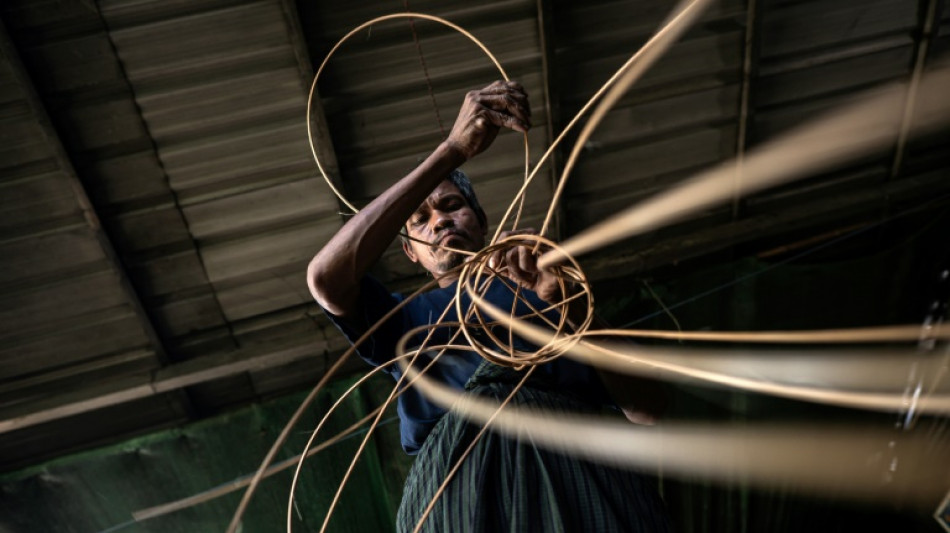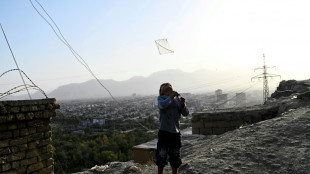
-
 Real Madrid thrash Kairat with Mbappe hat-trick
Real Madrid thrash Kairat with Mbappe hat-trick
-
Deepti, Amanjot fire as India crush Sri Lanka in Women’s World Cup opener

-
 Deadlines loom for Milan's Olympic village as Winter Games near
Deadlines loom for Milan's Olympic village as Winter Games near
-
At least 5 dead after strong quake in central Philippines

-
 Estonia PM says Russia incursions aim to distract EU from Ukraine: AFP interview
Estonia PM says Russia incursions aim to distract EU from Ukraine: AFP interview
-
DR Congo ex-president Kabila sentenced to death in absentia for 'treason'

-
 Trump says US government will 'probably' shut down
Trump says US government will 'probably' shut down
-
Board of Spain's Sabadell bank rejects improved BBVA takeover bid

-
 Howe blasts irrelevant criticism of Woltemade after 'idiot' jibe
Howe blasts irrelevant criticism of Woltemade after 'idiot' jibe
-
Erasmus ready for 'high stakes' Argentina clash in Rugby Championship finale

-
 Starmer vows to fight for Britain's 'soul', thwart far right
Starmer vows to fight for Britain's 'soul', thwart far right
-
Strong quake causes damage, panic in central Philippine island

-
 PSG must keep Barca's 'Harry Potter' Pedri at bay: Luis Enrique
PSG must keep Barca's 'Harry Potter' Pedri at bay: Luis Enrique
-
'I couldn't reach them': Afghans abroad despair at blackout

-
 US stocks slip as government shutdown looms
US stocks slip as government shutdown looms
-
Key warns England not to be 'stupid' on Ashes tour

-
 UN calls for Taliban to restore internet as Afghanistan goes dark
UN calls for Taliban to restore internet as Afghanistan goes dark
-
Saliba says he was focused on staying at Arsenal after signing new deal

-
 Starmer vows to fight for 'decent' Britain, as he battles Farage
Starmer vows to fight for 'decent' Britain, as he battles Farage
-
US on brink of government shutdown with funding talks stalled

-
 Human skin cells turned into fertilisable eggs for first time
Human skin cells turned into fertilisable eggs for first time
-
UN warns Myanmar conflict blocking Rohingya return

-
 Trump tells generals US faces 'war from within'
Trump tells generals US faces 'war from within'
-
Williams absence 'could help us', say Dortmund as Guirassy back against Athletic

-
 Louis Vuitton unveils ethereal collection at Paris Fashion week
Louis Vuitton unveils ethereal collection at Paris Fashion week
-
ECB chief says eurozone weathering Trump tariff storm

-
 Nche starts for South Africa as they eye Rugby Championship title against Argentina
Nche starts for South Africa as they eye Rugby Championship title against Argentina
-
AI tool helps researchers treat child epilepsy

-
 Brigitte Bardot slams Saint-Tropez after decades in jet-set port
Brigitte Bardot slams Saint-Tropez after decades in jet-set port
-
Pentagon chief tells US military leaders to fix 'decades of decay'

-
 Spotify founder Daniel Ek to give up CEO role
Spotify founder Daniel Ek to give up CEO role
-
Barca star Yamal must 'work hard' to reach top level, says Flick

-
 EU green lights Prada's bid for Versace
EU green lights Prada's bid for Versace
-
New youth-led protests in Madagascar despite government's dismissal

-
 Sinner to face teenager Tien in Beijing final as Gauff battles on
Sinner to face teenager Tien in Beijing final as Gauff battles on
-
Gold hits record, dollar drops as US shutdown looms

-
 Hamas reviewing Trump's Gaza plan
Hamas reviewing Trump's Gaza plan
-
Alcaraz beats Fritz in Tokyo for eighth title of season

-
 Vietnam jails former officials over gold bar graft: state media
Vietnam jails former officials over gold bar graft: state media
-
German far-right MP's ex aide jailed for spying for China

-
 Who will take 30,000 asylum seekers? EU solidarity faces big test
Who will take 30,000 asylum seekers? EU solidarity faces big test
-
PSG's Kvaratskhelia to miss Barcelona Champions League trip

-
 Endometriosis test backed by French government under scrutiny
Endometriosis test backed by French government under scrutiny
-
Madagascar protesters undeterred despite sacking of government

-
 Saliba signs new long-term deal at Arsenal
Saliba signs new long-term deal at Arsenal
-
Sinner powers into Beijing final as Gauff survives Bencic test

-
 Madagascar protesters mobilise despite firing of government
Madagascar protesters mobilise despite firing of government
-
Gauff calls for shorter tennis seasons as 'impossible' to play more

-
 Hamas yet to respond on Trump's Gaza plan
Hamas yet to respond on Trump's Gaza plan
-
Long-lasting Typhoon Bualoi devastates Vietnam, killing 19


Ancient Myanmar ball game battles for survival in troubled nation
Mastering control of the rising and falling rattan chinlone ball teaches patience, says a veteran of the traditional Myanmar sport -- a quality dearly needed in the long-suffering nation.
"Once you get into playing the game you forget everything," says 74-year-old Win Tint.
"You concentrate only on your touch and you concentrate only on your style."
Chinlone is Myanmar's national game and dates back centuries. Branded a blend of sport and art, it is often played to music, and is typically practised differently by men and women.
Male teams in skimpy shorts stand in a circle using stylised strokes of their feet, knees and heads to pass the ball in a game of "keepy-uppy", with a scoring system impenetrable to outsiders.
Women play solo like circus performers -- kicking the ball tens of thousands of times per session while walking tightropes, twirling umbrellas and perching on chairs balanced atop beer bottles.
Teen prodigy Phyu Sin Phyo hones her skills at the court in Yangon, toe-bouncing a burning ball while spinning a hula-hoop -- also on fire.
"I play even when I am sick," says the 16-year-old. "It is important to be patient to become a good chinlone player."
But play has plunged in recent years, with the Covid-19 pandemic followed by the 2021 military coup and subsequent civil war.
Poverty rates are shooting up and craftsmen face increasing problems sourcing materials to make balls.
But the rising and falling rhythm of the game offers its practitioners a respite.
"When you hear the sound of kicking the ball it's like music," Win Tint, vice-chairman of the Myanmar Chinlone Federation, told AFP.
"So when you play chinlone, you feel like dancing."
- 'Play day is happy' -
Different versions of the hands-free sport known as "caneball" are widely played across Southeast Asia.
In Thailand, Malaysia and Indonesia players kick and head the ball over a net in the volleyball-style "sepak takraw".
In Laos it is known as "kataw" while Filipinos play "sipa" -- meaning kick.
Myanmar's iteration dates back 1,500 years, according to popular belief.
Some cite a French archaeologist's discovery of a replica silver chinlone ball at a pagoda built in the Pyu era of 200 BC to 900 AD.
It was initially practised as a casual pastime, a fitness activity and for royal entertainment.
But in 1953 the game was given rules and a scoring system, as part of an effort to codify Myanmar's national culture after independence from Britain.
"No one else will preserve Myanmar's traditional heritage unless the Myanmar people do it," said player Min Naing, 42.
Despite the conflict, players still gather under motorway overpasses, around street lamps blighted with wartime blackouts and on dedicated chinlone courts -- often ramshackle open-sided metal sheds with concrete floors.
"For a chinlone man, the day he plays is always a happy day. I am happy, and I sleep well at night," says Min Naing.
"On the days I don't play it, I feel I am missing something."
- 'Respect the chinlone' -
But Win Tint is concerned that participation rates are falling.
"I worry about this sport disappearing," says master chinlone ball maker Pe Thein, toiling in a sweltering workshop in Hinthada, 110 kilometres (70 miles) northwest of Yangon.
"That's the reason we are passing it on through our handiwork."
Cross-legged men shave cane into strips, curve them with a hand crank and deftly weave them into a melon-sized ball with pentagonal holes, boiled in a vat of water to seal its strength.
"We check our chinlone's quality as if we're checking diamonds or gemstones," adds the 64-year-old Pe Thein.
"As we respect the chinlone, it respects us back."
Each ball takes around two hours to make and earns business-owner Maung Kaw $2.40 apiece.
But supplies of the best-quality rattan he covets from nearby Rakhine are dwindling.
There is fierce fighting in the state between the military and opposition groups that now control almost all of it.
Farmers are too fearful to plunge into the jungle battleground to cut cane, says Maung Kaw, endangering his profession.
"It should not be that we have players but no chinlone makers," says the 72-year-old.
"I want to work as well as I can for as long as I can."
B.Wyler--VB
